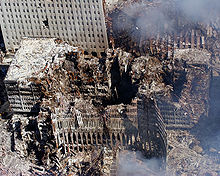Steve Reich: WTC 9/11 (2011)
Steve Reich’s New York apartment is just blocks from Ground Zero and the tragedy affected him deeply, but he couldn’t bring himself to engage with it musically until ten years after. In writing for the Kronos Quartet, Reich revisited a compositional technique he had used with them in Different Trains (1993), a poignant work that featured and imitated musically the recorded voices of Holocaust survivors. This time, it is the voices of firefighters, air controllers, on-the-street witnesses and the composer’s own friends and neighbours that are mimicked by the strings. The Jewish composer also sampled psalms and prayers for the dead sung at Ground Zero by two women and a cantor from a New York City synagogue.
Leading up to the release of the premiere recording of WTC 9/11, Reich and his record label Nonesuch met with public outcry when they revealed cover art depicting a documentary-style image of the Two Towers streaming with smoke moments after the attack. But far from sensationalist, Reich’s work is a personal tribute. “I hope it’s a moving piece,” he told Limelight. “It’s a piece that I put a lot of energy and time into.”

John Adams: On the Transmigration of Souls (2002)
It was a visit to Ground Zero that compelled American composer John Adams to write this large-scale memorial work for orchestra and chorus, premiered by the New York Philharmonic on the first anniversary of 9/11. Adams was most profoundly moved by the missing persons notices and scribbed prayers that proliferated at the site. He chose fragments of these to set to music alongisde his own peronal musings about the event and a list of victims’ names chosen at random. The names are intoned as part of an urban soundscape that surrounds listeners with the quotidien noise of traffic and footsteps.
For Adams, the word “transmigration” refers not only to “the transition from living to dead, but also the change that takes place within the souls of those that stay behind, of those who suffer pain and loss and then themselves come away from that experience transformed.”
The composer struggled to write a memorial work so soon after tragedy struck. “I was probably no different from most Americans in not knowing how to cope with the enormous complexities suddenly thrust upon us,” he said. “Being given the opportunity to make a work of art that would speak directly to people’s emotions allowed me not only to come to grips personally with all that had happened, but also gave me a chance to give something to others.”
The New York Philharmonic’s recording of The Transmigration of Souls, conducted by Lorin Maazel, won three Grammys in 2004, for Best Classical Album, Best Orchestral Performance and Best Contemporary Composition.
Michael Gordon: The Sad Park (2006)
Another poignant 9/11 tribute from Kronos Quartet. New York-based composer Michael Gordon developed the idea for this piece after his son’s pre-school teacher revealed she had been recording the kids in her class talking about the destruction of the World Trade Centre – something many of the children had witnessed or seen on television but could not fully grasp. He procured the tape and sampled four short phrases of spoken text, slowed almost beyond recognition, each forming the basis of a movement:
“Two evil planes broke in little pieces and fire came.”
“There was a big boom and then there was teeny fiery coming out.”
“I just heard that on the news that the buildings are crashing down.”
“And all the persons that were in the airplane died.”
The string quartet’s cyclic harmonies and punchy, repeated notes create a restless backdrop for the children’s innocent yet chilling descriptions of a cataclysmic event.
Joan Tower: In Memory (2002)
In the words of the composer: “The Tokyo String Quartet commissioned this string quartet composition in 2001. This one-movement piece about death and loss was written in memory of one of my friends, and later, of those who died in the September 11th terrorist attacks.”
Anthony Davis: Restless Mourning (2002)
This oratorio for mixed chorus, chamber ensemble and electronics sets text by poet Quincy Troupe and playwright Allan Havis alongside Psalm 102. The poems draw on the words of real victims, witnesses, and responders as well as the imagined thoughts of pilots, an unfortunate soul standing on top of the World Trade Centre, and even one of the terrorists.











Comments
Log in to join the conversation.